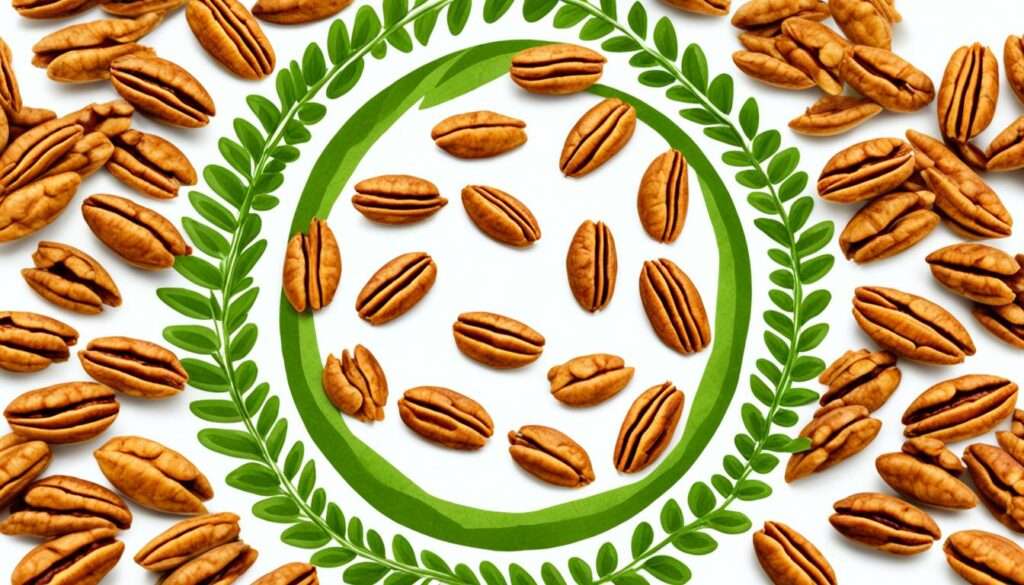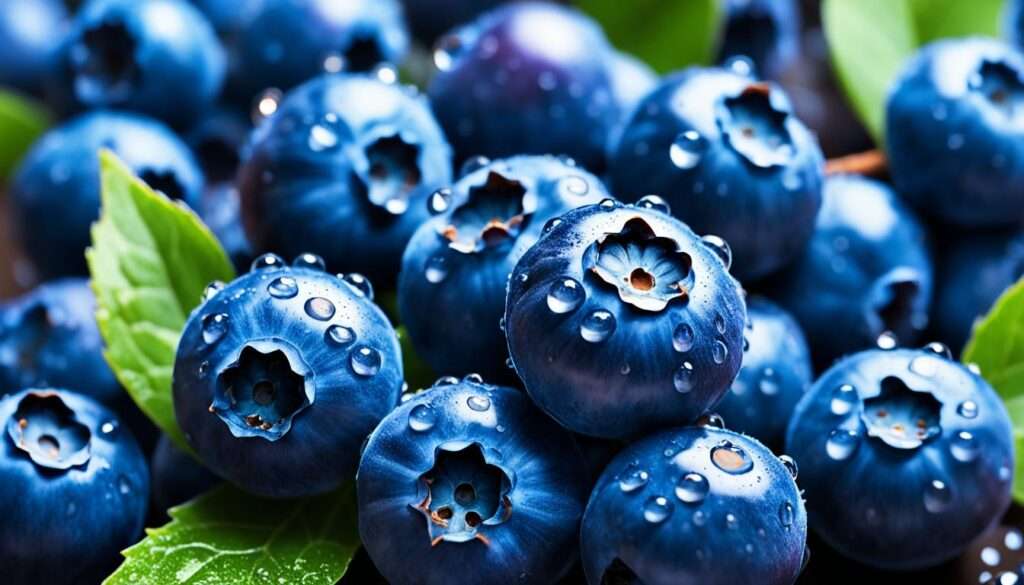Medically reviewed by Dr Chandril Chugh,
Renowned Neurologist and American Trained Specialist
Welcome to our article on the top foods rich in antioxidants that can help you fight free radicals and boost your overall health. Antioxidants are powerful compounds that play a crucial role in protecting your cells from oxidative stress, which can lead to chronic diseases. By incorporating these antioxidant-rich foods into your diet, you can strengthen your body’s defenses and promote wellness.
Table of Contents
ToggleKey Takeaways:
- Eating foods rich in antioxidants can help reduce oxidative stress and protect against chronic diseases.
- Dark chocolate is a great source of antioxidants and has been linked to health benefits such as decreased inflammation and reduced risk factors for heart disease.
- Pecans are high in antioxidants and healthy fats, making them beneficial for heart health.
- Blueberries are packed with nutrients and antioxidants that promote brain health and help lower cholesterol levels and blood pressure.
- Strawberries are sweet and high in vitamin C and antioxidants that support heart health.
1. Dark Chocolate
When it comes to indulgence, dark chocolate is not only a treat for your taste buds but also for your health. This delicious treat contains a higher percentage of cocoa than regular chocolate, making it rich in minerals and antioxidants.
The antioxidants found in cocoa and dark chocolate are known to have numerous health benefits. They can help decrease inflammation in the body and reduce risk factors for heart disease, such as high blood pressure and high cholesterol levels.
Research suggests that consuming dark chocolate in moderation may also have positive effects on brain function and mood. The flavonoids present in dark chocolate can improve blood flow to the brain and enhance cognitive function.
To fully appreciate the health benefits of dark chocolate, it is important to choose varieties that have a high cocoa content and lower sugar content. Look for dark chocolate with at least 70% cocoa to reap the maximum antioxidant benefits.
Health Benefits of Dark Chocolate:
- Decreased inflammation
- Reduced risk factors for heart disease
- Improved brain function
Add a square of dark chocolate to your daily routine and enjoy its antioxidant-rich goodness guilt-free.
| Minerals | Amount per 100g |
|---|---|
| Iron | 3.3mg |
| Magnesium | 176mg |
| Zinc | 3.3mg |
| Phosphorus | 285mg |

Indulge in a square of dark chocolate and delight in its rich taste and the array of health benefits it provides.
2. Pecans
Pecans are not only delicious but also packed with beneficial nutrients. These heart-healthy nuts contain a good amount of healthy fats and essential minerals like magnesium and zinc. But that’s not all – pecans are also a great source of antioxidants, which play a crucial role in supporting overall health and preventing chronic diseases.
Antioxidants are powerful compounds that help protect our cells from damage caused by harmful free radicals. By neutralizing these free radicals, antioxidants can reduce oxidative stress and inflammation in the body, leading to improved health outcomes.
In fact, studies have shown that incorporating pecans into your diet can significantly increase the levels of antioxidants in your bloodstream, helping to combat oxidative stress and maintain a healthy balance.
One of the key benefits of pecans is their potential to reduce the risk factors associated with heart disease. Research suggests that including pecans in a heart-healthy diet can help lower cholesterol levels, particularly LDL (bad) cholesterol. By doing so, pecans may help protect against heart disease, a leading cause of death worldwide.
The Heart-Healthy Benefits of Pecans
Here are some of the ways in which pecans can contribute to heart health:
- Lower Cholesterol: Pecans are rich in monounsaturated fats, which have been shown to help lower LDL cholesterol levels, reducing the risk of heart disease.
- Reduce Inflammation: The antioxidants in pecans have anti-inflammatory properties, which can help reduce inflammation throughout the body and support cardiovascular health.
- Support Artery Health: Pecans contain important nutrients like vitamin E, which can improve arterial function and protect against the development of atherosclerosis.
To incorporate pecans into your diet, try adding them to salads, oatmeal, or even enjoy them as a nutty snack. Their unique flavor and crunch make them a versatile addition to various dishes.

| Pecans Nutritional Facts (per 1 oz/28g) | Amount |
|---|---|
| Calories | 196 |
| Total Fat | 20.4g |
| Saturated Fat | 1.8g |
| Cholesterol | 0mg |
| Sodium | 0mg |
| Total Carbohydrate | 3.93g |
| Dietary Fiber | 2.7g |
| Sugars | 1.1g |
| Protein | 2.6g |
| Vitamin E | 1.53mg |
| Magnesium | 34mg |
| Zinc | 1.3mg |
3. Blueberries
Blueberries are a delicious and nutritious fruit that can provide numerous health benefits. Not only are they low in calories, but they are also packed with essential nutrients and powerful antioxidants.
The antioxidants found in blueberries, especially anthocyanins, play a crucial role in supporting brain health. Studies have shown that these antioxidants can have anti-aging effects on brain function, improving memory and cognitive abilities.
Furthermore, the antioxidants in blueberries can help reduce the risk factors associated with heart disease. They have been found to lower levels of LDL (bad) cholesterol, which can contribute to the development of heart disease. Additionally, blueberries have been shown to lower blood pressure, another risk factor for heart disease.
To fully understand the benefits of blueberries, take a look at the table below:
| Nutrient | Amount per 100g |
|---|---|
| Calories | 57 |
| Total Fat | 0.3g |
| Carbohydrates | 14g |
| Fiber | 2.4g |
| Protein | 0.7g |
| Vitamin C | 16% of the recommended daily intake |
| Vitamin K | 24% of the recommended daily intake |
| Antioxidants | High levels |

As you can see, blueberries are not only rich in antioxidants but also provide important vitamins and minerals that support overall health.
Incorporating blueberries into your diet is easy. They can be enjoyed on their own as a snack, added to smoothies, or used as a topping for yogurt, oatmeal, or salads. Whether fresh or frozen, blueberries are a versatile fruit that can be enjoyed year-round.
So next time you’re looking for a healthy and delicious snack, reach for some blueberries and give your brain and heart a boost!
4. Strawberries
Strawberries are a delicious and nutritious fruit that can contribute to your heart health. Not only are they sweet and refreshing, but they also contain a wealth of antioxidants that can benefit your cardiovascular system.
One of the key antioxidants found in strawberries is anthocyanin. This powerful compound has been shown to reduce the risk of heart disease by lowering levels of LDL cholesterol, commonly referred to as “bad” cholesterol, and increasing levels of HDL cholesterol, known as “good” cholesterol. By balancing cholesterol levels, strawberries can help maintain the health of your heart and reduce the risk of cardiovascular problems.
Aside from their heart-protective benefits, strawberries are also an excellent source of vitamin C, which further supports your overall health. Vitamin C is a potent antioxidant itself and plays a crucial role in strengthening the immune system, promoting collagen production for healthy skin, and aiding in the absorption of iron.
So, next time you’re looking for a tasty and nutritious snack, reach for a handful of strawberries. Not only will they satisfy your sweet tooth, but they’ll also provide you with a dose of antioxidants that can support your heart health.
5. Artichokes
Artichokes are a great addition to your diet, offering a range of health benefits. Not only are they delicious, but they are also packed with essential nutrients and antioxidants that can help support your overall well-being.
One of the key antioxidants found in artichokes is chlorogenic acid. This powerful compound has been shown to have numerous health benefits, including reducing the risk of certain cancers, type 2 diabetes, and heart disease. By incorporating artichokes into your meals, you can take advantage of this natural defense against these diseases.

Additionally, artichokes are rich in dietary fiber, which can aid in digestion and promote a healthy gut. This fiber content also helps to regulate blood sugar levels and support healthy weight management. Including artichokes in your meals can be a delicious way to boost your fiber intake and support your overall health.
Here is a breakdown of the nutritional content of artichokes:
| Nutrient | Amount per 100g |
|---|---|
| Calories | 47 |
| Carbohydrates | 10.5g |
| Fiber | 8.6g |
| Protein | 3.3g |
| Fat | 0.4g |
| Vitamin C | 12.2mg |
| Potassium | 370mg |
| Magnesium | 60mg |
| Copper | 0.2mg |
With their delicious flavor and numerous health benefits, artichokes are a versatile vegetable that can easily be incorporated into a variety of dishes. Whether roasted, steamed, or grilled, adding artichokes to your meals is a tasty way to support your health and reduce the risk of certain diseases.
6. Goji Berries
Goji berries are not just any ordinary fruit. These small, red berries pack a powerful punch when it comes to health benefits. Rich in vitamins and minerals, goji berries are a nutritional powerhouse that can help boost your overall well-being.
One of the key reasons why goji berries have gained popularity in recent years is their high antioxidant content. Antioxidants are compounds that help protect your cells from damage caused by free radicals. By neutralizing these harmful molecules, antioxidants can help reduce the risk of chronic diseases such as heart disease and cancer.
What sets goji berries apart from other fruits is their unique antioxidants known as Lycium barbarum polysaccharides. These compounds have been shown to have multiple health benefits, including a reduced risk of heart disease and cancer.
While the research on goji berries is still ongoing, studies have demonstrated their potential in improving cardiovascular health. A study published in the Journal of Alternative and Complementary Medicine found that goji berry consumption significantly reduced total cholesterol and triglyceride levels in participants.
Another study published in the European Journal of Nutrition showed that goji berries helped decrease markers of oxidative stress and inflammation among healthy adults. Both of these factors play a significant role in the development of heart disease.
However, it’s important to note that most of the studies conducted on goji berries have been animal-based or small-scale human trials. More extensive research is needed to fully understand the potential health benefits of goji berries in humans.
The Nutritional Profile of Goji Berries
In addition to their antioxidant properties, goji berries are also packed with essential vitamins and minerals. These berries are an excellent source of vitamin C, which is known for its immune-boosting benefits. They also contain a good amount of vitamin A, iron, and dietary fiber.
Here is a detailed breakdown of the nutritional composition of goji berries per 100 grams:
| Nutrients | Amount per 100g |
|---|---|
| Calories | 370 |
| Protein | 14 grams |
| Fat | 4 grams |
| Carbohydrates | 78 grams |
| Dietary Fiber | 9 grams |
| Vitamin C | 1,100% of the daily recommended intake |
| Vitamin A | 290% of the daily recommended intake |
| Iron | 35% of the daily recommended intake |
Goji berries are incredibly versatile and can be enjoyed in various ways. You can add them to your morning smoothie, sprinkle them over salads, or simply eat them as a snack. Their naturally sweet taste makes them a favorite among many health-conscious individuals.
While goji berries offer a range of health benefits, it’s important to incorporate them as part of a balanced diet. Aim for a variety of antioxidant-rich foods to maximize the benefits and support overall health.
7. Raspberries
Raspberries are a delicious and nutritious fruit that provides numerous health benefits. These vibrant berries are packed with antioxidants, including anthocyanins, which give them their vibrant red color. Antioxidants play a key role in reducing inflammation and protecting the body against oxidative stress caused by free radicals.
One cup of raspberries contains about 8 grams of dietary fiber, which is essential for maintaining a healthy digestive system. Fiber helps regulate blood sugar levels, supports weight management, and promotes feelings of fullness.
In addition to fiber, raspberries are a rich source of vitamin C, providing over 50% of the recommended daily intake in just one cup. Vitamin C is essential for a strong immune system, collagen production, and protecting cells against damage from harmful free radicals.
Raspberries are also a good source of manganese, a trace mineral that helps support bone health, regulate blood sugar levels, and protect against oxidative stress. Manganese is involved in numerous biochemical processes in the body and is necessary for the functioning of enzymes involved in metabolism.
Health Benefits of Raspberries:
- Reduce inflammation: The antioxidants in raspberries have anti-inflammatory properties that help reduce inflammation in the body.
- Lower oxidative stress: Raspberries’ high antioxidant content helps combat oxidative stress, which is linked to chronic diseases such as heart disease and certain cancers.
- Support heart health: The combination of antioxidants, dietary fiber, and other beneficial compounds in raspberries may help lower the risk of heart disease.
- Aid in weight management: The fiber content in raspberries helps promote feelings of fullness and can assist with weight management goals.
- Boost skin health: The vitamin C in raspberries aids in collagen production, which promotes healthy skin and reduces the signs of aging.
To reap the maximum benefits from raspberries, enjoy them fresh, frozen, or in various recipes. Add them to smoothies, sprinkle them on top of yogurt or oatmeal, or incorporate them into baked goods for a burst of flavor and antioxidants.
| Nutrition Facts | Serving Size (1 cup, raw) |
|---|---|
| Calories | 64 |
| Carbohydrates | 14.7 grams |
| Fiber | 8 grams |
| Protein | 1.5 grams |
| Fat | 0.8 grams |
| Vitamin C | 54% of the Recommended Daily Intake |
| Manganese | 41% of the Recommended Daily Intake |
Include raspberries in your diet to enjoy their delicious taste and reap the many health benefits they offer. Whether eaten on their own or incorporated into various recipes, raspberries are a nutritious addition to a balanced diet.
8. Kale
Kale is a highly nutritious green that is packed with essential nutrients and antioxidants, making it an excellent addition to a healthy diet. This leafy vegetable is known for its crisp texture and earthy flavor.
Not only is kale a great source of vitamins A, K, and C, but it also contains minerals like calcium, which supports bone health. Additionally, kale is rich in antioxidants, which help protect the body from oxidative stress caused by harmful free radicals.
One of the standout antioxidants in kale is lutein, which has been specifically linked to promoting eye health. Lutein filters out harmful blue light and helps maintain the health of the retina. Including kale in your diet can therefore support optimal eye function and help reduce the risk of age-related macular degeneration.
Another group of antioxidants found in kale is anthocyanins. These give red kale its vibrant color and provide additional health benefits, such as reducing inflammation and preventing chronic diseases.
Adding kale to your meals can be as simple as sautéing it with some garlic and olive oil, tossing it into salads, or blending it into smoothies for an extra nutritional boost.
Conclusion
Antioxidants are essential for maintaining your overall health and well-being. By incorporating a variety of antioxidant-rich foods into your diet, you can boost your blood antioxidant levels and reduce the risk of chronic diseases such as heart disease, cancer, and Alzheimer’s disease.
Consuming foods like dark chocolate, pecans, blueberries, strawberries, artichokes, goji berries, raspberries, and kale can provide you with a wide array of antioxidants that offer numerous health benefits. These antioxidants help protect your cells from free radicals and decrease oxidative stress, which can lead to chronic health conditions.
If you’re looking to prevent chronic diseases and improve your overall health, consider adding these nutrient-dense foods to your meals and snacks. Whether you’re craving a sweet treat like dark chocolate or a refreshing bowl of berries, make sure to prioritize foods high in antioxidants as part of your balanced diet. Your body will thank you for it!
FAQ
What are antioxidants?
Antioxidants are compounds that defend cells from free radicals, which can cause oxidative stress and increase the risk of chronic diseases.
How can eating a diet rich in antioxidants help?
Eating a diet rich in antioxidants can help reduce oxidative stress and protect against chronic diseases.
What are some foods that are high in antioxidants?
Here are 9 potent foods that are high in antioxidants:
How does dark chocolate contribute to antioxidant intake?
Dark chocolate contains more cocoa than regular chocolate, making it rich in minerals and antioxidants. The antioxidants in cocoa and dark chocolate have been linked to health benefits such as decreased inflammation and reduced risk factors for heart disease.
What makes pecans a good source of antioxidants?
Pecans are a type of nut that are high in healthy fats and minerals. They are also a good source of antioxidants and can help raise antioxidant levels in the blood. Pecans may also help reduce cholesterol levels, which is a risk factor for heart disease.
How do blueberries contribute to antioxidant intake?
Blueberries are low in calories but packed with nutrients and antioxidants. The antioxidants in blueberries, especially anthocyanins, have been shown to have anti-aging effects on brain function and reduce risk factors for heart disease. Blueberries can also lower LDL cholesterol levels and blood pressure.
What makes strawberries rich in antioxidants?
Strawberries are sweet and rich in vitamin C. They contain a lot of the antioxidant anthocyanin, which can reduce the risk of heart disease by lowering LDL (bad) cholesterol levels and raising HDL (good) cholesterol levels.
What makes artichokes a good source of antioxidants?
Artichokes are a great source of dietary fiber, minerals, and antioxidants. They are especially rich in an antioxidant called chlorogenic acid, which may reduce the risk of certain cancers, type 2 diabetes, and heart disease.
What are the unique antioxidants in goji berries?
Goji berries are rich in vitamins and minerals, and they contain unique antioxidants known as Lycium barbarum polysaccharides. These antioxidants have been linked to a reduced risk of heart disease and cancer. However, more human-based research is needed to fully understand their health benefits.
How do raspberries contribute to antioxidant intake?
Raspberries are a great source of dietary fiber, vitamin C, and manganese. The antioxidants in raspberries, especially anthocyanins, can reduce inflammation and oxidative stress. This may lower the chance of developing heart disease and certain cancers.
Why is kale considered a high-antioxidant food?
Kale is a highly nutritious green that is rich in calcium, vitamins A, K, and C, and antioxidants. Red varieties of kale contain more anthocyanin antioxidants, which give them their vibrant color and provide additional health benefits.
How do antioxidants protect against chronic diseases?
Antioxidants play a crucial role in protecting cells from free radicals and reducing oxidative stress. Consuming a variety of foods rich in antioxidants can help boost blood antioxidant levels and reduce the risk of chronic diseases like heart disease, cancer, and Alzheimer’s disease.
